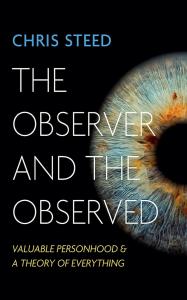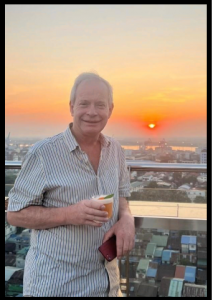TOMAH, WI, UNITED STATES, April 16, 2025 /EINPresswire.com/ -- The Observer and the Observed: Valuable Personhood and a Theory of Everything
This book approaches the God-question in a different way than normal: from the perspective of psychotherapy. In a world of machine intelligence, the key idea is an analogy of being between human personhood and divine personhood as the only satisfactory way of showing that our inner conscious awareness (nourished by the validation of the self) is responded to in ultimate terms. It aims to extrapolate ‚Äúfrom below,‚ÄĚ from our psychological experience to asking ultimate questions, drawing lines between:
‚ÄĘ Observation in quantum physics
‚ÄĘ The maternal gaze
‚ÄĘ Recognition in social worlds that confer perception in place of invisibility
‚ÄĘ The power of inter-subjectivity in relational neurobiology and therapy
What has to be accounted for is our sense of personhood and how that fits in with a cosmos that is at best neutral. The metaphor of a ‚Äúwifi‚ÄĚ universe is proposed but rather than a soulless device being switched on, how a human psyche comes to a sense of consciousness of its own value is the issue here.
A personal God is the best explanation for the evidence of how our personhood and subject status requires correspondence. As engaging with a neutral AI entity is bound to be ‚Äúsoulless,‚ÄĚ the first-person perspective requires an I-thou relationship.
A universe constructed from ‚Äúnature‚ÄĚ by itself or one where the ultimate is impersonal energy just does not cut it or respond adequately to what is inside us. This book offers an account of how the realm described by physics and our inner world can tie up‚ÄĒperhaps the only way they can!
Chris Steed is a writer, philosopher, and theologian as well as a qualified counselor and therapist. This book emerged from many years of reading and reflecting on big questions posed by science and cosmology. Crucially, it also emerged from client work as a therapist, noting the central importance of needing to be of value and worth for psychological flourishing.
INTERVIEW WITH CHRIS STEED
Can you tell us about the genesis of this book?
This book arose from reflecting over many years on the big questions of science and life. I have been fascinated by the work of Einstein, cosmologists, and philosophers. Around the year 2000, I began to sit up and take notice of what was a familiar enough refrain in response to human distress: ‚ÄėI‚Äôm worth more than that‚Äô! Why did people want to assert their value, as if we were discussing the value of a house or car? From that seed, I started to theorize the role that a high value and worth played in a human life ‚Äď and crucially, what happens when that is eroded or absent.
That quest led to pursuing doctoral-level studies resulting in books of social science and eventually The Significance of High Value in Human Behaviour (a book on psychology) and Finding the Valuable Person (on counselling). The new book continues that exploration into the ultimate philosophical questions it poses.
Can you explain The argument from human personhood?
The steps from a personal being in humankind to a supra-personal being in an ultimate, divine realm need to be traced.
‚óŹ we have a strong psycho-social need to be valued
‚óŹ the universe could have developed so as to generate no significance for its observers
‚óŹ the universe could have developed so as to generate significance for its observers.
‚óŹ if Step Three is invalid, we go inexorable towards an impersonal universe- no God Hence Step
Three is likely to be correct. In an impersonal, neutral universe, the human person has risen higher
than its source and there is nothing out there that corresponds to what’s inside us.
Or put another way:
Step One ‚Äď human beings need to live in a valuing environment and feel we are people of worth.
If that is forthcoming, we thrive. Without a sense of value (either imparted or internalized), we wither. Sociology and psychology point in this direction. But so too do common human experiences of central importance in contemporary life (the lack of value and powerlessness felt by millions in the West who feel the world passes them by and also intensified social comparison that bedevils the mental health of teenage girls)
Step Two ‚Äď how does this come about?
How does the universe generate animals (human participants) who not only are conscious and self-aware but have an imperative towards high worth? Is this mere evolutionary conceit? Is there something out there that corresponds to what’s in here? Or has an impersonal universe given rise to this fundamental way we are wired up?
Step Three ‚Äď This is not just a question of how the mind is generated from matter. It is the hard problem of soft value.
The universe is ordered. It is not a whimsical place but ordered for valuable personhood. However, the problem of suffering and providence would seem to be against this. Yet an ultimate Being is required to imprint valuable personhood onto matter, information, and self-replicating systems God is the ultimate valuer, the one who confers value on humanity who are in the mind and mirror of God.
A personal God is the most satisfactory explanation of valuable personhood. We can object all we want but we only have to look within to know we need to be of value as people. On what is that based? The nature of ultimate reality is that there is an underlying personal realm. To conceive of what is ultimate as impersonal, energy or ‚Äėthe universe‚Äô simply does not cut it!
Can you tell us about your previous writings?
My earlier work includes books in the areas of psychology, management, social theory and theology. I am an Anglican minister and during my work have written an original book-length history of a set of English parishes through time based on original research and stories I heard in active service titles Let the Stones Talk (available through Amazon).
What were you doing before ministering?
My first career was in Government service. Many years in church leadership followed, 25 years in all, including some years combined with professional counseling after qualifying. In addition, I spent 3 years in a leadership role of a large international charity and 7 years in education management in a secondary context. Since 2020 I have led the work of a university department training counselors and theologians.
Please visit www.christophersteed.co.uk for more on the author.
This book is now available for purchase on Amazon and other major online retailers, or you may click this link: https://www.amazon.com/Observer-Observed-Valuable-Personhood-Everything-ebook/dp/B0DM4HPPHJ/ref
An Excerpt from the Observer and the Observed: Valuable Personhood and the Theory of Everything
The wonderfully evocative film ‚Äėa theory of everything‚Äô depicts the brilliant physicist Stephen Hawking developing approaches to the cosmos. His accounts of black holes and of time became part of the staple diet of contemporary physics; sparked off as the narrative shows by a quest to find a single equation that can constitute a theory of everything that lives, moves and has its being.
What makes the film an absorbing story is the drama of personal life and love against the backcloth of motor- neurone’s disease. On the one hand is the scientific quest; on the other is a very human story of loss, persevering love and difficulty generating narrative drive and points of identification. As observed at one moment in the film, the quest to find what lies at the heart of ultimate reality is due to the best two descriptions not aligning. General Relativity, theorised by Albert Einstein, does not map on to quantum mechanics. One way of phrasing this is that the physics of the very large and the physics of the very small are incompatible partners. They seem to play by different rules.
But there has to be more ‚Äď far more ‚Äď to a theory of everything than squaring this mathematical circle. What about the private dramas we play out in the brief history of our personal time? How do they cohere with a material reality that equations attempt to describe? They are every much as real as the ‚Äėhard‚Äô objects we see and encounter around us. Where do they fit in? How can an account of reality that seeks to be in any way totalising not take account of any notion that we cannot thrive without being worthwhile people living worthwhile lives? Is this really a theory of everything?
I walk amidst soft grandeur of trees. The way in which my thoughts blend in with the landscape shows that my inner being is integrally related to what is around me. A theory of everything that can encompass the very people who endeavour to find it surely needs to point to how what gives our lives significance and meaning folds into the fabric of everyday reality- how the ‚Äėsoft‚Äô stuff can possibly relate to the ‚Äėhard‚Äô stuff. In so doing, it might need to accomplish at least two objectives:
i. It must give an account of how humans derive a realm of value, love, meaning and Spirit from the unpromising materials of quarks and leptons: the building blocks of material reality being entirely neutral regarding what makes our existence worthwhile:
ii. It must give ab explanation of how the human self-consciousness of its own personhood and value derives from the fabric of the cosmos and is, so to speak, ‚Äėswitched on‚Äô from it.
There are many moves available in such a project. We might say that physical reality is all there is: that physics describes everything ultimately: even our lives and loves. Those who espouse the view that ‚Äėnature‚Äô by itself is responsible for our consciousness and our self-consciousness are holding to a perspective that goes by several names- scientism, naturalism, materialism or physicalism.
We might say that we will be agnostic in relation to the ontological nature of ultimate reality but in practice pursue science and philosophy as if nature is all ‚Äď a stance of ‚Äėmethodological naturalism.
We might say that the cosmos is impersonal cosmic energy as in Dao or is conscious (panpsychism).
Or we might infer that there is a deeper and greater reality underpinning the cosmos: a universe that welcomes us and both instigates and responds to our personhood. This is our quest. It leads us to the personal: to a Subject that holds our subjectivity and to the Observer who sees and acts.
Praise for the Observer and the Observed: Valuable Personhood and the Theory of Everything
‚ÄúThis is definitely a worth-while book, an original approach to the ‚ÄėGod-question‚Äô based on personhood and deserves a hearing. I am in strong agreement with its argument. Chris has provided some valuable insights in it, and it is attractively argued.‚ÄĚ
‚ÄĒKeith Ward, Regius Professor of Divinity Emeritus, University of Oxford
Luna Harrington
Prime Seven Media
+1 414-882-5318
email us here
Visit us on social media:
Facebook
X
Legal Disclaimer:
EIN Presswire provides this news content "as is" without warranty of any kind. We do not accept any responsibility or liability for the accuracy, content, images, videos, licenses, completeness, legality, or reliability of the information contained in this article. If you have any complaints or copyright issues related to this article, kindly contact the author above.




